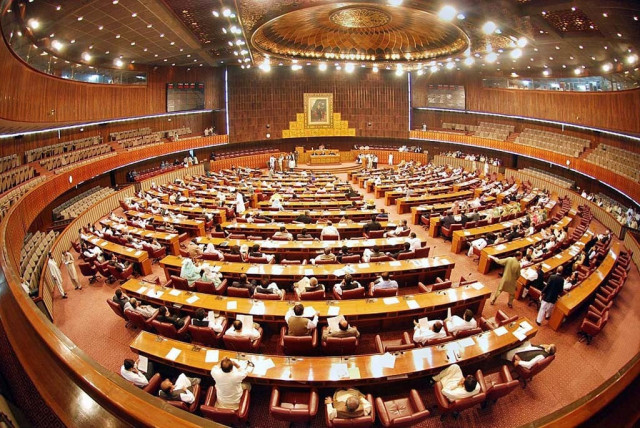'India stonewalling water talks'
The agenda included updates on the under-construction Dasu and Mohmand Dam projects

A National Assembly panel was told on Wednesday that while the Pakistan Commission on Indus Waters (PCIW) is tasked with engaging New Delhi on transboundary water issues, the dialogue table has remained empty for the past two years due to India's reluctance to come to the negotiating table.
The NA Standing Committee on Water Resources, chaired by Ahmad Ateeq Anwar, convened for an in-depth briefing on the country's key hydropower projects and the growing strain caused by India's repeated disregard for treaty obligations.
Federal Minister for Water Resources Mian Muhammad Muneer Wattoo, Water Resources Secretary Syed Ali Murtaza, WAPDA Chairman Lt Gen (retd) Sajjad Ghani, former WAPDA chairman Shakil Durrani and Pakistan's Indus Water Commissioner Syed Mehr Ali Shah were in attendance.
The agenda included updates on the under-construction Dasu and Mohmand Dam projects, along with the status of the Neelum Jhelum Hydropower Project.
Addressing the panel, the water resources secretary noted that while the PCIW holds the brief for initiating talks with India over shared water resources, there has been radio silence from across the border.
"The Indus Waters Treaty cannot be unilaterally suspended," the secretary affirmed, adding that "we will take India's violations to international arbitration and other global forums".
He asserted that under the treaty, Pakistan holds full rights over the three western rivers, while India may only use a limited quantity for domestic and agricultural purposes and generate hydropower without altering the river flow.
"India cannot divert the flow of rivers," he added.
Committee chairman Ahmad Atiq Anwar directed that the committee be briefed on six canal projects, responding to a request by Dawar Kundi.
Minister Wattoo added, "Whenever the committee wishes, we will arrange a visit to the Dasu Dam site and facilitate meetings with affected communities."
Wattoo called for discussions on India's water aggression and violations of the Indus Waters Treaty, noting that the Council of Common Interests (CCI) had already resolved some of the issues.
In his briefing, WAPDA Chairman Lt Gen (retd) Sajjad Ghani disclosed that Pakistan receives 140 million acre-feet (MAF) of water annually, However, it can only store 13 MAF due to siltation. "The country has the capacity to store up to 20 MAF, but due to silt, current usable storage is limited to 13 MAF," he noted.
He further explained that silt cannot simply be released, as it would damage the barrages. "Damage to the barrages could severely impact the agriculture sector," he warned.




















COMMENTS
Comments are moderated and generally will be posted if they are on-topic and not abusive.
For more information, please see our Comments FAQ